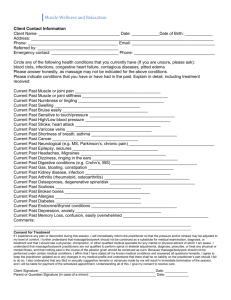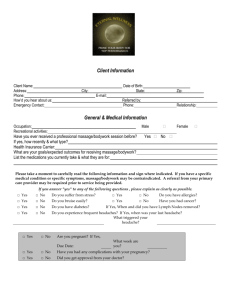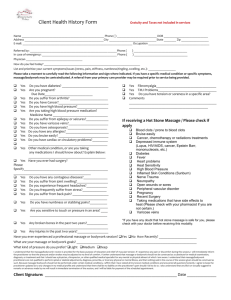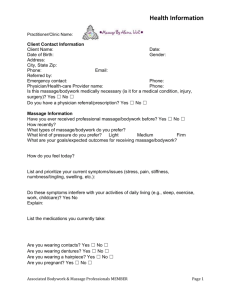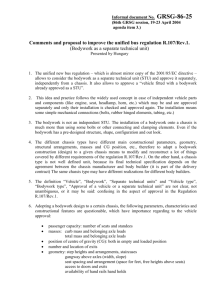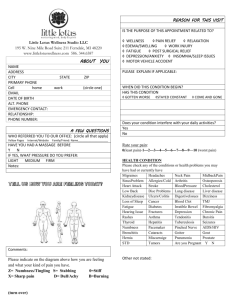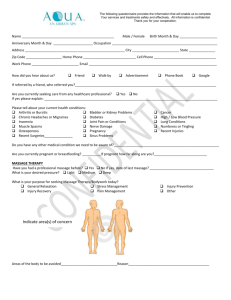National Health Freedom Action Bill Analysis Massachusetts SB
advertisement
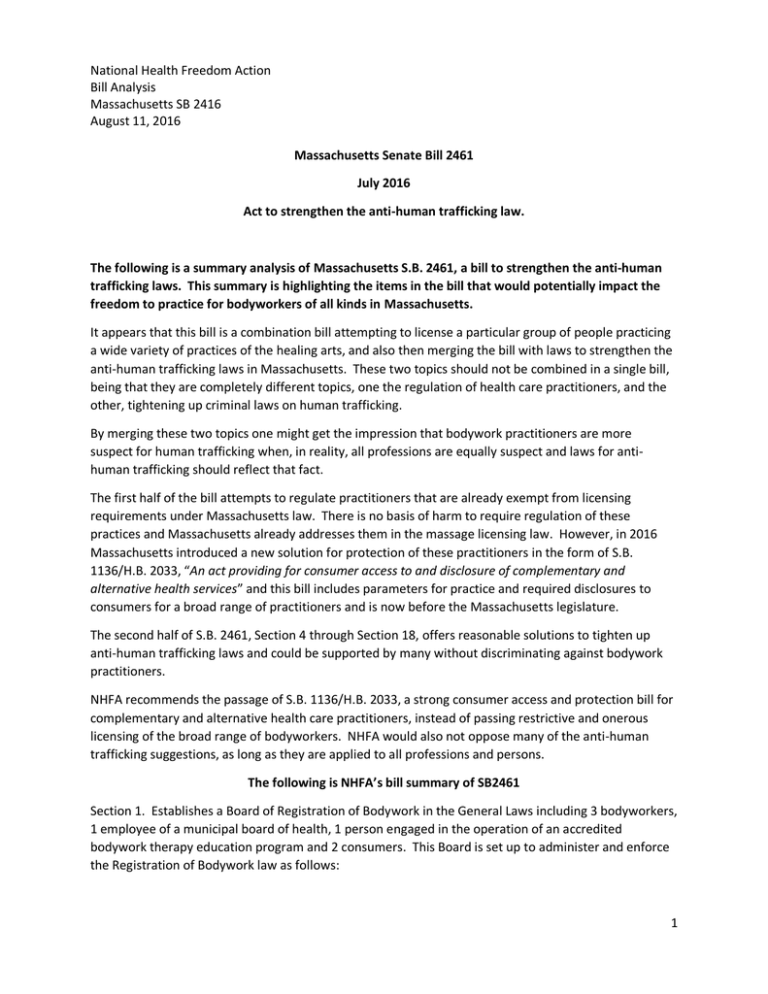
National Health Freedom Action Bill Analysis Massachusetts SB 2416 August 11, 2016 Massachusetts Senate Bill 2461 July 2016 Act to strengthen the anti-human trafficking law. The following is a summary analysis of Massachusetts S.B. 2461, a bill to strengthen the anti-human trafficking laws. This summary is highlighting the items in the bill that would potentially impact the freedom to practice for bodyworkers of all kinds in Massachusetts. It appears that this bill is a combination bill attempting to license a particular group of people practicing a wide variety of practices of the healing arts, and also then merging the bill with laws to strengthen the anti-human trafficking laws in Massachusetts. These two topics should not be combined in a single bill, being that they are completely different topics, one the regulation of health care practitioners, and the other, tightening up criminal laws on human trafficking. By merging these two topics one might get the impression that bodywork practitioners are more suspect for human trafficking when, in reality, all professions are equally suspect and laws for antihuman trafficking should reflect that fact. The first half of the bill attempts to regulate practitioners that are already exempt from licensing requirements under Massachusetts law. There is no basis of harm to require regulation of these practices and Massachusetts already addresses them in the massage licensing law. However, in 2016 Massachusetts introduced a new solution for protection of these practitioners in the form of S.B. 1136/H.B. 2033, “An act providing for consumer access to and disclosure of complementary and alternative health services” and this bill includes parameters for practice and required disclosures to consumers for a broad range of practitioners and is now before the Massachusetts legislature. The second half of S.B. 2461, Section 4 through Section 18, offers reasonable solutions to tighten up anti-human trafficking laws and could be supported by many without discriminating against bodywork practitioners. NHFA recommends the passage of S.B. 1136/H.B. 2033, a strong consumer access and protection bill for complementary and alternative health care practitioners, instead of passing restrictive and onerous licensing of the broad range of bodyworkers. NHFA would also not oppose many of the anti-human trafficking suggestions, as long as they are applied to all professions and persons. The following is NHFA’s bill summary of SB2461 Section 1. Establishes a Board of Registration of Bodywork in the General Laws including 3 bodyworkers, 1 employee of a municipal board of health, 1 person engaged in the operation of an accredited bodywork therapy education program and 2 consumers. This Board is set up to administer and enforce the Registration of Bodywork law as follows: 1 National Health Freedom Action Bill Analysis Massachusetts SB 2416 August 11, 2016 (i) to administer and enforce sections 265 to 272, inclusive, of chapter 112; ( ii) to adopt rules and regulations governing the licensure of bodywork therapists, the practice of bodywork therapy and the operation of bodywork therapy establishments and schools to promote the public health, welfare and safety of the citizens of the commonwealth; (iii) to establish standards of professional and ethical conduct; (iv) to establish standards for continuing education reflecting acceptable national standards; (v) to investigate complaints, conduct inspections, review billing and treatment records and set and administer penalties as defined in sections 61 to 65F, inclusive, and sections 265 to 272, inclusive, of chapter 112 for fraudulent, deceptive or professionally incompetent and unsafe practices and for violations of rules and regulations promulgated by the board; and (vi) to make available to the public a list of licensed bodywork therapists. Section 2. This section deals with the requirements of licensure. Some of the key components are: it defines Bodywork (lines 48-59) and makes it a requirement for those practicing within that definition to be licensed (Lines 62-67); it describes persons who are exempt from licensing requirements, such as other licensed professionals practicing within their scope (lines 68 – 79); it describes qualifications for obtaining a license (lines 80-95 and lines 128-138), for renewal of a license (lines 96-112), requirements for posting license (lines 113-115 and lines 171-172); and the Board’s power to investigate and discipline (lines 139-154) and to request a cease and desist to practitioners for a list of potential violations (lines 155-157). Section 2 also prohibits the use of the terms “bodywork” or “bodywork therapy” by persons who do not hold a license under this act (lines 173-177). It also prohibits advertising for bodywork under certain circumstances (lines 182-192) and it requires municipalities to be consistent with this law when developing new ordinances and by-laws (lines 193-197). Relevant sections are listed below. “Bodywork” or “bodywork therapy”, the use of touch, words or directed movement to deepen awareness of patterns of movement in the body, or the affectation of the human energy system or acupoints or Qi meridians of the human body including, but not be limited to: the Feldenkrais method; reflexology; the Trager approach; Ayurvedic therapies; Rolf structural integration; polarity or polarity therapy; polarity therapy bodywork; Asian bodywork therapy; acupressure; Jin Shin Do; Qi Gong; Tui Na; Shiatsu; body-mind centering;Reiki and Bowenwork; provided, however, that bodywork or bodywork therapy shall not include massage as that term is defined in section 227; and provided, further, that bodywork therapy shall not include diagnosis of illness or disease, the prescription of drugs or medicines, spinal or other joint manipulations, electrical stimulation, application of ultrasound or any services or procedures for which a license to practice medicine, chiropractic, acupuncture, massage therapy, occupational therapy, physical therapy or podiatry is required by law. Section 266. (a) No person shall advertise or be otherwise characterized as a bodywork therapist or practice bodywork or bodywork therapy unless that person holds a valid license issued in accordance with this chapter; Section 266 (b) The following individuals shall be exempt from the licensure requirements of this section: (i) a person duly licensed, registered or certified in another state, territory, the District of Columbia or a foreign country who is temporarily in the commonwealth to teach a course related to bodywork therapy or to consult with a person licensed as a bodywork therapist under this chapter; (ii) a person providing 2 National Health Freedom Action Bill Analysis Massachusetts SB 2416 August 11, 2016 bodywork therapy to a member of that person's immediate family for which the person receives no compensation; (iii) a person who holds a professional license, certificate or registration under the General Laws who performs services within the scope of practice authorized by the license, certificate or registration but does not hold themselves out to be a bodywork therapist; and (iv) a person, duly licensed, registered or certified in another state, territory, the District of Columbia, or a foreign country, who is incidentally in the commonwealth to provide service as part of an emergency response team working in conjunction with disaster relief officials. Section 267. (a) “…the board may issue a license to practice as a bodywork therapist to an applicant who: (i) is 18 years of age or older; (ii) is of good moral character as determined by the board; (iii) has obtained a high school diploma or its equivalent; (iv) has submitted 2 professional letters of reference including at least 1 letter from an employer or licensed professional in the field of bodywork therapy or a similar field as defined by the board; (v) has successfully completed a course of study consisting of at least 500 classroom hours or an equivalent number of credit hours of supervised instruction in a nationally accredited bodywork therapy program; (vi) has not been convicted in any jurisdiction of a sexually-related crime or a crime involving moral turpitude during the 10 years immediately preceding the date of application; (vii) provides proof of professional liability coverage; and (viii) demonstrates professional competence as determined by the board. Section 267 (d) Every person receiving a license from the board shall conspicuously display the license in the licensee’s place of business Section 270. (a) The board shall conduct inspections and investigate all complaints filed relating to the proper practice of bodywork therapy and any violation of sections 265 to 272, inclusive, or any rule or regulation of the board. Complaints may be brought by any person or municipality, or the board may initiate a complaint. For the purposes of this section and sections 61 to 65F, inclusive, conduct which places into question the holder's competence to practice bodywork therapy shall include, but not be limited to: (i) committing fraud or misrepresentation in obtaining a license; (ii) criminal conduct resulting in a conviction, guilty plea or plea of nolo contendere or an admission of sufficient facts; (iii) violating a rule or regulation of the board; (iv) failing to cooperate with the board or its agents in the conduct of an inspection or investigation; (v) failing to fulfill any continuing education requirements set out by the board; or (vi) violating an ethical standard which in the board’s determination renders the person unfit to practice as a bodywork therapist including, but not limited to, inappropriate conduct or touching in the practice of bodywork therapy, offering medical opinion or diagnosis or negligence in the course of professional practice. (c) The board may issue an order to a licensee directing the licensee to cease and desist from unethical or unprofessional conduct if the board finds, after the opportunity for a hearing, that the licensee has engaged in such conduct. Section 272. (a) Only persons duly licensed under this chapter shall be designated as bodywork therapists and entitled to use the term “bodywork” or “bodywork therapy” when advertising or printing promotional material. Any person who uses the term “bodywork” in a professional title without being authorized to do so may be the subject of disciplinary action by the board under section 65A. (b) Any person who: (i) knowingly aids and abets another person in the use of the term “bodywork” as part of a professional title when the person using the term is not authorized to do so; or (ii) knowingly 3 National Health Freedom Action Bill Analysis Massachusetts SB 2416 August 11, 2016 employs unlicensed individuals in the operation of a bodywork therapy business may be the subject of a disciplinary proceeding before the board. (c ) It shall be a violation of this chapter for a person to advertise; (i) as a therapist or a bodywork therapy business unless each person employed as part of the business, and acting as a bodywork therapist, holds a valid license under this chapter; (ii) licensed bodywork therapy services with escort or dating services; (iii) as specializing in particular bodywork therapy services without an appropriate showing of competency as determined by the board; or (iv) services not recognized as bodywork therapy by the board or explicitly prohibited under section 265. The term “advertise” as used in this section shall include, but not be limited to: (A) providing a card, sign or device to another; (B) causing, permitting, or allowing a sign or marking on or in a building, vehicle or structure; (C) causing the placement of an advertisement in a newspaper, magazine or on television; or (D) listing or causing the placement of an advertisement in a directory under a classification or heading that includes the word “bodywork”. Section 273. A city or town may adopt ordinances or by-laws relative to health and safety of the practice of bodywork therapy not inconsistent with sections 265 to 272, inclusive; provided, however, that local ordinances pertaining to bodywork therapy in effect prior to the effective date of sections 265 to 272, inclusive, of the General Laws and that are consistent with and that may exceed the requirements of those sections may remain in effect. Section 3. This section appears to contain a typo because it seeks to repeal Section 269 of Chapter 112, Registration of Certain Professions and Occupations, but Section 269 does not exist; the final section in chapter 112 is Section 264. Section 4. This is amending Chapter 120, Department of Youth Services and Massachusetts Training Schools, Section 12 by adding human trafficking offenses to the offenses taken into consideration when a child who has had violations is being placed back into their usual home, triggering the ability of the Department of Youth Services to be able to notify the police authority, of the city or town of which a child is a resident and as the police authority of the city or town where the offense occurred, of the intention to place such child in his usual home. Section 5. This is amending Chapter 127, Officers and Inmates of Penal and Reformatory Institutions. Paroles and Pardons, Section 90A, regarding human trafficking as it relates to temporary release of committed offenders. Section 6. Amending Chapter 140, Licenses, to provide that State police or members of the police department of a town may, upon appropriate legal process, enter and inspect any premises in a town where bodywork or bodywork therapy services are provided under chapter 112. Section 7. Expanding time in which victims of human trafficking may bring legal action, from 3 years to 10 years under Chapter 270 Statute of Fraud of Limitation, Limitation of Actions. 4 National Health Freedom Action Bill Analysis Massachusetts SB 2416 August 11, 2016 Section 8. Amending Chapter 265, Crimes Against the Person, Section 57, so that victims of human trafficking can use the affirmative defense to charges of common night walking, or common street walking. Adding other crimes that victims of human trafficking were charged with where they could use an affirmative defense. Section 9. Adding a new section, Section 59, to Chapter 265, Crimes Against the Person, regarding the issue of vacating convictions based on being a victim of human trafficking. Section 10. Adding a new section, Section 87B, to Chapter 276, Search Warrants, Rewards, Fugitives from Justice, Arrest, Examination, Commitment and Bail. Probation Officers and Board of Probation, to allow for the creation of first offender commercial sexual exploitation prevention programs. Section 11. Adding a new section, Section 100E, to Chapter 276, Search Warrants, Rewards, Fugitives from Justice, Arrest, Examination, Commitment and Bail. Probation Officers and Board of Probation, for the instances when found not guilty, having sealed records and nondisclosure to employer parameters. Section 12. Adding new law giving directives for reporting of crime statistics regarding human trafficking. Section 13. Providing for the development of a website to disseminate information regarding human trafficking, human trafficking crime statistics and resources for victims of human trafficking. Section 14. Providing for the trainings in identifying and responding to human trafficking. Section 15. Providing for public awareness programs to educate potential victims of human trafficking and their families on the risks of victimization. Section 16. Providing for public awareness campaign advertising and displays by MA Dept. of Transportation and by employers, and employer fines for non-compliance of posting. National Human Trafficking Resource Center hotline visibility. Section 17. Providing for the reporting back to the legislature outlining the adequacy and limitations of current services to meet the safety, support, housing, health, education and quality of life needs of human trafficking victims. Section 18. Providing for human trafficking prevention business partnership. 5
